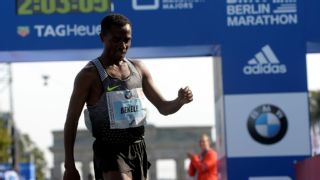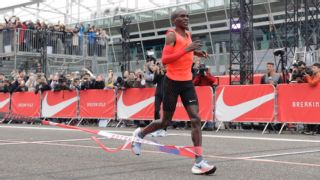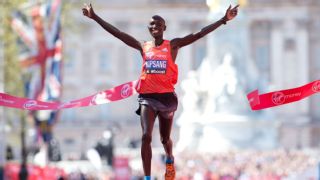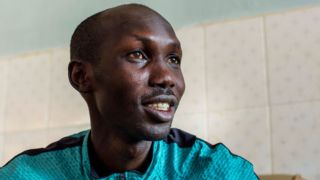|
Wilson Kipsang says he wants to join the exclusive company of Haile Gebreselassie who shattered the world marathon record twice. Three other Kenyans, Paul Tergat (2003), Patrick Makau (2011) and Dennis Kimetto (2014) broke the world record in Berlin. In the 2013 Berlin Marathon, Kipsang clocked 2.03.23 for his record. Having ran sub-2:04 in his last two races in Berlin, where he finished second, and Tokyo, where he won in an all-comers record time of 2:03.58, Kipsang shares his thoughts on his 2017 season with KweséESPN.  How do you rate the last edition of the Berlin Marathon where you grabbed a personal best of 2:03.13 behind eventual winner Kenenisa Bekele? "My season has been good so far, all the way from Tokyo, I took my rest well for about one month and I have been building up for Berlin and I can feel my body is responding well as the race nears." "I can say last year in Berlin it was one of the best races since I had prepared well to break the world record. I want to really say I achieved one part of my target of improving my personal best, but the other part of breaking the world record I didn't," the Kenyan star said. "The whole thing was a big mess-up because I had to push the pace alone as the pacemakers were really not that strong. From 27km to 42km, to do that on your own is very difficult, plus my competitor and the eventual winner that is Bekele, he didn't help much as he ran from behind all through and that slowed us during the last kilometres and we didn't break the world record. "What I learnt from it, is that this time around we need to have pacemakers who push steady from the start and are good. As for all competitors, we need to work together because running alone is not ideal. "Especially as for Eliud Kipchoge, we need to do push together till 37km and then I can handle it," Kipsang added. How does it feel to run sub-2:04 a record four times? "For me, you find I'm one of the best now, I have managed to run under 2:04 four times and sub-2:05 in another four races, no one has ever done that. The secret behind this is just consistency, I'm always training and I have known how to prepare, how to run a 2:04, a 2:03 or 2:05. "With my preparations it's just a matter of improving on some areas and then knowing that this is the target, and I always achieve [it], it's just matter of being disciplined, staying focused and train well. It's not matter of training hard but training well. Knowing what do and doing it at the right time," he said. So, how big is the race on Sunday? "This year's Berlin Marathon field is very strong. We have Kenenisa Bekele and Eliud Kipchoge, these guys have been doing very well on the track. Bekele, a world-record holder in 5000m and 10000m; Kipchoge has been featuring in those events too and they know each other very well, but for me I think I am more specialised in marathon. "If you try to see their races in the marathons, they have done well but I am more experienced than them, so when we meet there is a high chance of producing the best this time. "Also, the other bad side is if all the guys will be very strong and there is a chance that everybody will be trying to keep a close watch on the other one, that sometimes lowers the time so much. It might reach a point where everyone just wants to go for a win and it's not about time anymore. It is a two-way fate."  Why are fast times and records often recorded at Brandenburg Gate? "You find that in the Berlin Marathon course what helps so much is not even the flatness, it is the weather, the weather there is always 80 percent good and with the course being flat the probability of fast times is very high. If you compare [it] to London, it is always equally good, as seen when Eliud Kipchoge ran 2:03.05 very close to the world record, but the weather always is a factor as it is cold most of the time but in the German city, the temperatures are always between 10 to 17 degrees, 12 to 16 degrees and those are temperatures that assist so much." Having broken the world record before, what factors are ideal to achieve this again? "What it takes to break the world record is, first, determination, it all starts from you; you should have that feeling and that confidence that you want to go for that record. Then from there the preparations come in, what will you do? You have to start the right buildup, stay healthy, have [the] right training programme, have strong guys in training and know right timings. "Sometimes you find guys train so much by the time you go and compete you are already tired, so you should make sure you pick your shape just when the race is very close because sometimes you find that you have trained and you are in top shape one month before the race, so by the time you compete you are out. "Sometimes I train until when I'm running I feel like I'm in the race and the body should be in a position to sense, is that pace a world-record pace or you can run a 2:04, 2:05 or 2:03." With such a high-quality race, what effect does the pressure bring? "With the kind of pressure it helps to run well because you know you have the family, your fans and everybody watching, knowing you once broke the world record and they want you to do it again and are looking forward to see you compete with Bekele and Kipchoge, wondering who is going to win. It really gives you pressure because in a way you have to do something, it disappoints us if you don't run because the body doesn't respond or you are sick on the day, you find that you might not feel it for yourself but you feel it for your fans. "I like challenge, that gives me motivation to run even faster. For me stay high I have to challenge that record again and see if I can do it twice."  How much did the 2017 Tokyo Marathon win and clocking an all-comers record motivate him for this quest? "I want to say that when I ran in Tokyo the record was 2:05:42; my plan was to try to run the world record in Tokyo because my body was in a shape of 2:03 or 2:02 and running 2:03.58 proved that I still have the potential to go for the record, because if I compare that to Berlin." What next after Berlin? "I don't want to say what next after Berlin because I always plan after the event. I will sit with my manager and evaluate what I will perform and we decide for next season." Expectations for Sunday? "First to win, then to break the world record, that is it." With the world record at 2:02.57, will he be satisfied if he runs 2:02.56? "Yes. I will be satisfied, that is a world record I would have achieved."
|

